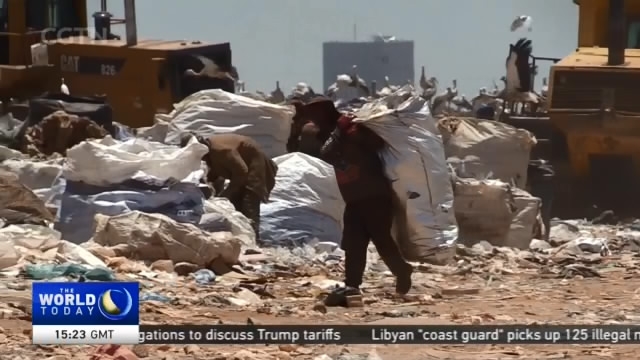
08:45, 11-Mar-2018
Listeriosis in South Africa: Brands recall products as focus shifts to meat disposal

Let's head now to South Africa, where food companies are recalling certain kinds of processed meat following a deadly bacterial outbreak. The government has pinpointed the source of contamination that has led to the deaths of at least 183 people. CGTN's Angelo Coppola picks his way through the challenge of disposing tons of processed meat products.
Getting rid of listeriosis-infected and potentially infected processed cold meats is not as simple as first thought. Consumers have been urged to take processed meats back to retailers and wholesalers, who will safely dispose of the product.
DR. JOHAN SCHOONRAAD TREATMENT DISPOSAL SPECIALIST, ENVIROSERVE "So there's two sources. One is incineration. And the other is hazardous waste landfills. Municipal waste landfills are not good because of people access."
Municipal landfill sites can't do the job, for another reason.
MUZI MKHWANAZI SPOKESPERSON, PIKITUP "Unfortunately municipal landfill sites like the one you seeing at the back, are not equipped to deal with such waste. Remember you need special technical know how and also in most of the cases incinerators, which means to burn that particular kind of waste. So municipal landfill sites do not have such facilities.
The privately owned sites are managed differently.
DR. JOHAN SCHOONRAAD TREATMENT DISPOSAL SPECIALIST, ENVIROSERVE "If we ignore the engineering, it's access control. Because we are dealing with hazardous chemicals, every day, we obviously have very strict access control to make sure nobody that's not supposed to be on the site, is on the site."
Incineration is an option.
MPINANE FLORY SENEKANE LECTURER, UJ ENVIRONMENTAL HEALTH "The waste that is being sent to be disposed of, it must not only be disposed of, as it is. It should first be treated and once it is treated it becomes as an ash. So in that way, it will be reduced. So the amount of waste, the initial waste will be reduced. So the landfill sites will cope."
So how do the businesses get rid of the contaminated food, besides incineration, which isn't an option, because there's no spare capacity.
DR. JOHAN SCHOONRAAD TREATMENT DISPOSAL SPECIALIST, ENVIROSERVE "Clearly we can do chemical treatment which is exactly what we are going to do. We are not only going to bury the material, and typically what we would do, is deep trenching. To make sure that even our own employees, which clearly we don't want at all, to get access to the material, after it's been buried."
Some are still concerned that government hasn't done enough.
MPINANE FLORY SENEKANE LECTURER, UJ ENVIRONMENTAL HEALTH "Government should, it should have an alarm to government to say this is not the situation that ends here. We cannot just say outbreak, outbreak warning away people about outbreak. The government should do something. Because now we are just talking about outbreak. But it doesn't mean that the problem is solved."
ANGELO COPPOLA JOHANNESBURG We have a potential crisis on our hands, if for whatever reason, people stop buying those processed meats. So that 4000 tons that's currently going to get disposed of, will probably double or even triple. I'm Angelo Coppola for CGTN in Johannesburg, South Africa.

SITEMAP
Copyright © 2018 CGTN. Beijing ICP prepared NO.16065310-3
Copyright © 2018 CGTN. Beijing ICP prepared NO.16065310-3